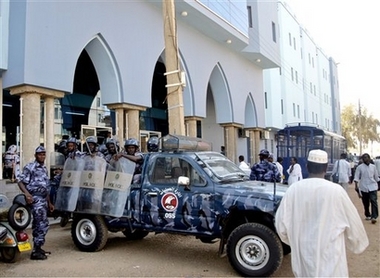Sudan doctors carry out court ordered amputation sentence
February 27, 2013 (NAIROBI) – Sudanese government doctors amputated a man’s right hand and left foot by court order in Khartoum on 14 February, violating international laws prohibiting torture and cruel, inhuman, or degrading punishments, rights groups said Wednesday.
 In a statement extended to Sudan Tribune, the African Centre for Justice and Peace Studies (ACJPS), Human Rights Watch (HRW), REDRESS and Physicians for Human Rights (PHR) called on Sudanese leaders and the international community to condemn the practice and to urge swift reform of Sudanese laws in line with the country’s international human rights commitments.
In a statement extended to Sudan Tribune, the African Centre for Justice and Peace Studies (ACJPS), Human Rights Watch (HRW), REDRESS and Physicians for Human Rights (PHR) called on Sudanese leaders and the international community to condemn the practice and to urge swift reform of Sudanese laws in line with the country’s international human rights commitments.
According to reliable sources, medical doctors at the Sudanese ministry of interior’s Al-Rebat Hospital in Khartoum carried out what is called cross-amputation on 30-year-old Adam Al-Muthna, carrying out a sentence for an armed robbery conviction.
“Cross amputation is a form of state-sponsored torture,” said Dr Vincent Iacopino, a senior medical advisor at PHR. “The complicity of medical personnel in such practices represents a gross contravention of the UN principles of medical ethics for health personnel, particularly medical doctors who engage, actively or passively, in acts of torture or other cruel, inhuman or degrading treatment or punishment”, he added.
The al-Sudani daily newspaper reported that Muthna was convicted of firing on a car with an assault rifle between North Kordofan and East Darfur in March 2006 and stealing SDG 1,000 (US$228) from its passengers.
The Sudanese Penal Code provides cross amputation as a penalty for armed robbery when it results in grievous injury or involves theft of property with a value exceeding SDG 1,500 or about $340.
HIGHEST STANDARDS
The statement said physicians and other health professionals must hold themselves to the highest professional standards of commitment to human rights, even under threat of harm.
ACJPS executive director Osman Hummaida has reiterated calls for amputations and other inhumane punishments to be abandoned, saying such practices had “no place in any criminal justice system”.
Amputation as a form of corporal punishment was incorporated into Sudanese law in 1983 when then-president Gaffar Nimeiry introduced Islamic reforms known as the “September laws”.
Although sentences imposing amputations have been handed down under those laws, there are no known cases since 2001 in which such sentences have been carried out, with human rights groups hoping this had signalled a de facto moratorium on the practice.
HRW’s Africa director, Daniel Bekele, said Sudan also routinely practiced other forms of corporal punishment, including stoning and flogging, usually carried out for drinking alcohol.
Both penalties are forms of corporal punishment justified under the country’s Islamic Shari’a law.
In 2012, two sentences of death by stoning for adultery were imposed on women but were later overturned following international outcry.
“The practice of corporal punishment in Sudan is frequently used as an instrument of repression against those who do not conform to the state’s conception of moral order”, said Dr Lutz Oette, counsel at REDRESS.
As a party to the International Covenant on Civil and Political Rights, Sudan has made a commitment to an absolute ban on torture and cruel, inhuman or degrading treatment or punishment.
Sudan is also a party to the charter of the African Commission on Human and Peoples’ Rights (ACHPR). In a separate case concerning the use of flogging as a punishment in Sudan, the commission found: “There is no right for the government of a country to apply physical violence to individuals for offences. Such a right would be tantamount to sanctioning state sponsored torture”. Sudan also signed, but has yet to ratify, the UN Convention against Torture.
(ST)
